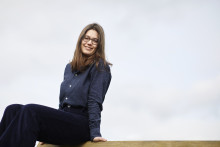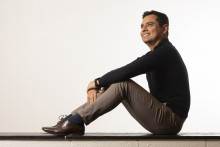Jeanne Parmentier
PhD research topic: Can machines understand equine locomotion, and what can we learn from it?
Work: PhD candidate at the Utrecht University Faculty of Veterinary Medicine and at the Pervasive Systems group, Faculty of Electrical Engineering, Mathematics and Computer Science at the University of Twente
Education: Master’s degree in Biology Engineering at the Université de Technology de Compiègne (France)
Originally from: Lille, France
‘I love horses! I never thought I could work with them, unless I’d clean stables or be a professional horse rider, and so I was really happy to get my PhD position – which is partly at the UT and partly in Utrecht. In very simple words, my PhD is about horses and computers. At the UT, I focus on the computer and sensor part, while in Utrecht I work on the biomechanics and veterinary part, including direct work with horses in a clinic. My research focuses on using motion sensors on horses to measure their movements in order to see if they are healthy or lame, which is the equivalent of limping in humans.
As horses cannot talk, lameness is not a straightforward issue. Its cause and extent is not always visible and clear. It could come from pain, or from a mechanical or neurological issue, such as spine problems. It’s a symptom of something that is wrong or could go wrong. In mild cases, we know that three different vets can look at the same horse and disagree on where exactly the lameness comes from. As lameness is often displayed as movement asymmetries, we develop tools to quantify movement in horses. The goal of my research is to then use the data collected and bring useful information to the different stakeholders, mostly veterinarians, with the ultimate goal of improving horses’ welfare.’
‘I have loved horses since I was three years old even though nobody in my family was involved with horses. I started riding and competing and it quickly became a defining passion for me. They are impressive creatures. I find it fascinating to observe how they move and behave, especially as they could throw you down in a matter of seconds but don’t - most of the time at least. Working for horses and with horses is one of the reasons why I love my job.
'Working for horses and with horses is one of the reasons why I love my job'
When I was younger, I loved sciences and I wanted to work in a genetics lab as a technician. While growing up, I realized that engineering would fit me better because the tasks are more diverse and I could find solutions to help people. I wasn’t planning to do a PhD. I used to think of PhD research as something for only very clever people and I didn’t see myself as especially clever. After my Master’s, I got a job in Research and Development department of a company, where a couple of PhDs worked. They had nice jobs, but as a PhD inside a company you are not really allowed to publish your findings or go to conferences, because the knowledge should stay inhouse. That is why I was happy to get the offer from Utrecht and the UT, as I knew I could more freely explore my research ideas and goals.’

‘I’m in my fourth year now. The first years of my PhD were a bit messy. I didn’t have the typical PhD track because of COVID-19, it bothered me that I had to stay at home so much. It was also a bit difficult for me to define my project at first. I was doing my own thing, which is good but also a bit overwhelming. Regardless, I really enjoy doing a PhD. I love going to the field and working with animals, talking to the veterinarians, horse owners and riders, to see how we could help them. And I really love programming and data processing as well. I’m very enthusiastic about all parts of my research.
'I expected there to be more team work'
I had no expectations when I started the PhD journey, and so I was never actually disappointed. Although I expected there to be more team work. That is not necessarily the case. I live and work mostly in Utrecht, and because of the pandemic and the lockdowns, the UT hasn’t been so present in my life. I haven’t been able to come to the campus as often as I wanted. Moreover, my research project is quite different from my colleagues’. I’m currently the only one working on anything related to horses at my Twente group and the only one working on computer sciences in my Utrecht group, which means my research is very autonomous. Everyone works on their own project and it can be hard to create collaborations. That might be the only regret I have in my PhD. I would have liked to be in the Twente office more and find opportunities to work with my colleagues there.’
‘I don’t know if I want to stay in academia full-time or even if I could, as positions and funding are limited. My ideal position would be part-time in a company and part-time at a university. I will not put all my chips on academia, but I definitely want to keep a foot in the academic world. I would also like to stay in the Netherlands, as I am very attached to the country. When I got the offer to come here, combining my passions for horses and computers to a country I love, I knew that dreams can come true!
'You will always have low weeks but it’s easier to come back up if you love what you do'
If anyone is considering to do a PhD, I’d advise them to get to know their group before they start. Not all teams work well together. I was extremely lucky in how everything turned out, but I heard about this issue from other people. You should find a team that fits you and a topic that you are really passionate about. Four years is a long time, and it’s so much easier to go to work if you love your research project. You will always have low weeks but it’s easier to come back up if you love what you do.’







